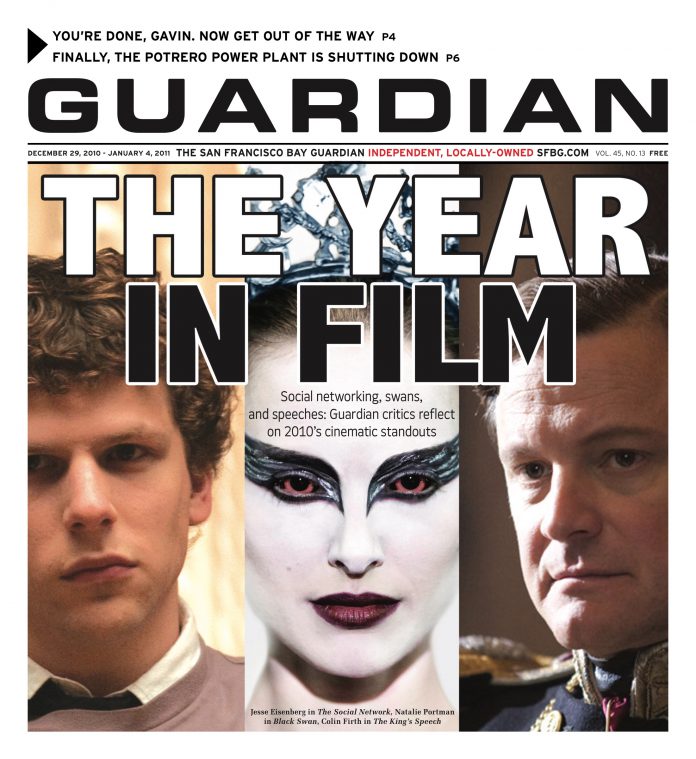arts@sfbg.com
YEAR IN FILM Who’s your daddy? That tired line was more relevant ever in 2010, as big screens saw a firming trend in sperm-donor comedies. These films have attacked so-called family values from a much more commonplace front. After all, artificial insemination is an everyday occurrence. Thousands of multiple births happen in this country every year — according to the Centers for Disease Control and Prevention, there were almost 6,000 triplet births in 2007 — for mothers who are increasingly older and unmarried, and a good many of the multiples result from assisted reproductive therapies such as artificial insemination.
Many a hand has been wrung, historically, over the impact of childbearing among unmarried women: the CDC report’s author cites concerns about family structure and the economic security of children, stating that single moms have more limited financial resources than married breeders. But then what to make of such 2010 comedies as The Kids Are All Right, The Switch, and The Back-up Plan? — not to mention the small-screen tabloid shenanigans of Octomom and the arti-insem antics of the Gosselin family?
Coming on the heels of Baby Mama (2008), which saw two women surmounting class barriers to bond over surrogacy, and welfare-sploitation drama Precious (2009), which included possibly the most nightmarish single mom ever, 2010’s unmarried, artificially inseminated cinematic moms tellingly embody the idea of choice — though the repercussions of their decision to have a child by either an unnamed baby daddy or a known, accomplished stud donor, are still considered the stuff of laughs, both realistic and aspirational.
While The Back-Up Plan rings as the most by-the-book, tepid rom-com of the lot and The Switch feels like a curveball, focusing more on Jason Bateman’s drunken DNA switcheroo and his resulting sad-faced and neurotic offspring (implying a kind of ambivalence about artificial insemination), the best of the bunch is The Kids Are All Right. Grounded and realistic, the dramedy is confident enough to leave a few loose ends dangling, to give the power to the fruit of those supposedly unnatural unions. Just one teensy step beyond gay marriage, gay parenting in The Kids Are All Right is normative, even bourgeois, with one mom, Nic (Annette Bening), working as a doctor and the other, Jules (Julianne Moore), a stay-at-home searching for herself.
As open-minded as the narrator of the Who song that gives the film its title, kids Joni (Mia Wasikowska) and Laser (Josh Hutcherson) are piecing out their identities, in part by independently searching out their biological donor dad Paul (Mark Ruffalo), in part by making some very adult decisions about whether they want to have a relationship with him and whether they can trust him. Eons away from the classic messed-up single-mom offspring, Joni and Laser turn out to be more psychologically on-point and morally centered than their moms or bio pop Paul, a feckless Peter Pan charmer ready to jump into the family that life has presented him but irresponsible and thoughtless when it comes to embarking on an affair with Jules.
The painfully transparent, slowly-evolving hurt look on Nic’s face when she realizes the two are sexually involved turns our sympathies around to the side of the mom saddled with the bad cop-disciplinarian role, the uptight one seemingly at odds with the kickback California sunshine. A recent bitter, real-life custody battle between a U.K. lesbian couple and their sperm donor hasn’t sorted out quite so well. Family apparently has its limits — and its moments of forgiveness. The 1970s and ’80s TV and musical clans — à la the bunches Brady, Partridge, and Osmond — may have pushed a semi-subtextual message about togetherness in the face of social and generational upheaval, but these women and their kids are still working it out as they go.

